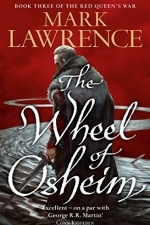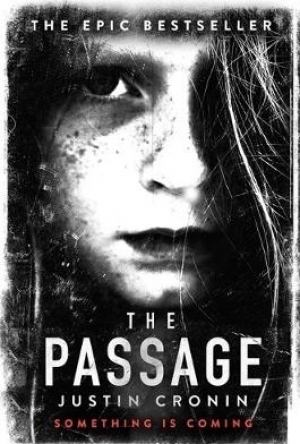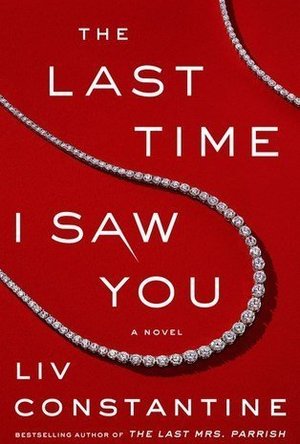Search
Search results

The Flight: Charles Lindbergh's Daring and Immortal 1927 Transatlantic Crossing
Book
Written by "one of the most decorated pilots in Air Force history" (New York Post ), a gripping and...

MEGA MAN 2 MOBILE
Games and Entertainment
App
The Second Chapter in the Mega Man saga, Dr. Wily returns! Mega Man's fight has only just begun... ...

Pass (Shattered Pawns #1)
Book
Luca: I’ve lived my life in the pursuit of justice. I worked my way from the police academy to...
MMM LGBTQ+ Fantasy Romance
Steven Sklansky (231 KP) rated Halt and Catch Fire - Season 4 in TV
Nov 6, 2017
Writing (2 more)
Cast
Very nostalgic
The Future is Here, So Watch How it Arrived
Well this was the 4th and final season of Halt and Catch Fire and it went by way to fast. This was such a fantastic season and it was sad to see it go. For those of you that have never seen this show, shame on you and go watch it on Netflix. For those who haven't caught up I will not spoil anything for you.
This show is about a group of programmers that try to stay ahead of the technology curve and make the last tech better. This season was all about making a search engine. You know like Yahoo or Google. It was such a long road to get there and there was a lot of obstacle to get there first and be the best.
The 2 groups going after it were the father/daughter pair and mother/tech firm pair. I won't tell you who one but it was wild. Both companies took different directions to make the same product and it was very interesting to see the progression. The best part of this show is how they take the real life way they got there and used fake names like Comet and Rover, but also used the real competition like AOL and Netscape to show they are in the same universe.
The characters this season really had a lot of drama, some good and some bad, but for my still it was a little much. I know TV shows need it to keep people watching to feel like they are involved, but sometimes you have to let the big picture speak for itself. But I did not mind it at all, sometimes you have to look the other way to enjoy the show.
This whole show was leading us to the future of technology and it was so much fun watching everything grow just like I did when I was a kid. Watching them play Nintendo for the first time and this season added Playstation which was kind of cool. But this show could have lasted so much longer and even added to characters along the way to make it happen. I think they jump a head in time too fast to make show reach the finish line. I with they would have stretched it a little longer. Oh well, all good things must come to an end.
Like I said earlier, if you haven't watch the show, get to watching and let me know what you think. If you have watched, lets get talking about how much you loved or hated it. Till next time, enjoy the show.
This show is about a group of programmers that try to stay ahead of the technology curve and make the last tech better. This season was all about making a search engine. You know like Yahoo or Google. It was such a long road to get there and there was a lot of obstacle to get there first and be the best.
The 2 groups going after it were the father/daughter pair and mother/tech firm pair. I won't tell you who one but it was wild. Both companies took different directions to make the same product and it was very interesting to see the progression. The best part of this show is how they take the real life way they got there and used fake names like Comet and Rover, but also used the real competition like AOL and Netscape to show they are in the same universe.
The characters this season really had a lot of drama, some good and some bad, but for my still it was a little much. I know TV shows need it to keep people watching to feel like they are involved, but sometimes you have to let the big picture speak for itself. But I did not mind it at all, sometimes you have to look the other way to enjoy the show.
This whole show was leading us to the future of technology and it was so much fun watching everything grow just like I did when I was a kid. Watching them play Nintendo for the first time and this season added Playstation which was kind of cool. But this show could have lasted so much longer and even added to characters along the way to make it happen. I think they jump a head in time too fast to make show reach the finish line. I with they would have stretched it a little longer. Oh well, all good things must come to an end.
Like I said earlier, if you haven't watch the show, get to watching and let me know what you think. If you have watched, lets get talking about how much you loved or hated it. Till next time, enjoy the show.
Ross (3284 KP) rated The Wheel of Osheim in Books
May 23, 2018
Contains spoilers, click to show
The conclusion of the Red Queen's War trilogy is a significant improvement over the previous book, The Liar's Key. Though again this is a book of two halves: the first half following Jalan as he travels home from the Afriquan desert and is tasked with defending his home city from invasion; the second half sees him meet up with old friends and travel back to the eponymous Wheel to try and halt mankind's destruction and stop "the wheel" from turning.
I loved the first half of this book - Jalan is a much easier character to like/put up with on his own, and the city defence against siege was some of the most enjoyable of Lawrence's work, for me.
The second half was a definite nose-dive. Jalan goes back to being an insufferable coward (and given his companions say and do very little this makes these scenes quite a trudge). And it seems as if this was the chance to suddenly explain the point of the earlier "companion" Broken Empire trilogy and cram in loads of science and philosophy. Suddenly we went from knowing next to nothing but occasional hints to being repeatedly told what had happened 1100 years ago and what is still happening. And then in the last few pages, all back to normal, having no idea what was real or not.
At the end of The Liar's Key, I had such anticipation for this book: Jalan and Snorri entering Hell to try and bring back Snorri's family. This became such a massive anti-climax - the whole journey through Hell was covered in about 20 pages total and nothing of any import happened at all. It was a complete let-down.
One of the standout aspects of The Broken Empire trilogy was how two different timelines were maintained and meshed together beautifully at the perfect pace. Here we have an element of that, but Lawrence seems to feel the need to have a reason for Jalan to be experiencing the other timeline (in Liar's Key is was due to a magic spell which had unexpected recurring side-effects, here it is either through having flashbacks at inappropriate times or being told a story by Snorri) - it just totally jars when this suddenly has to happen.
The conclusion of the book I found very unsatisfying - too many key events/characters/plot points were suddenly thrown into one room fighting for attention and resolution - and what were meant to be epic foes to be bested were defeated fairly easily. And then the actual climax - a complete load of philosophical nonsense completely unravelling everything (not in a "woah, that blew my mind" way, more of a "well, what was the point then and what about ... ").
Overall a mostly great book but with some downright annoying aspects and a deeply unsatisfactory ending.
I loved the first half of this book - Jalan is a much easier character to like/put up with on his own, and the city defence against siege was some of the most enjoyable of Lawrence's work, for me.
The second half was a definite nose-dive. Jalan goes back to being an insufferable coward (and given his companions say and do very little this makes these scenes quite a trudge). And it seems as if this was the chance to suddenly explain the point of the earlier "companion" Broken Empire trilogy and cram in loads of science and philosophy. Suddenly we went from knowing next to nothing but occasional hints to being repeatedly told what had happened 1100 years ago and what is still happening. And then in the last few pages, all back to normal, having no idea what was real or not.
At the end of The Liar's Key, I had such anticipation for this book: Jalan and Snorri entering Hell to try and bring back Snorri's family. This became such a massive anti-climax - the whole journey through Hell was covered in about 20 pages total and nothing of any import happened at all. It was a complete let-down.
One of the standout aspects of The Broken Empire trilogy was how two different timelines were maintained and meshed together beautifully at the perfect pace. Here we have an element of that, but Lawrence seems to feel the need to have a reason for Jalan to be experiencing the other timeline (in Liar's Key is was due to a magic spell which had unexpected recurring side-effects, here it is either through having flashbacks at inappropriate times or being told a story by Snorri) - it just totally jars when this suddenly has to happen.
The conclusion of the book I found very unsatisfying - too many key events/characters/plot points were suddenly thrown into one room fighting for attention and resolution - and what were meant to be epic foes to be bested were defeated fairly easily. And then the actual climax - a complete load of philosophical nonsense completely unravelling everything (not in a "woah, that blew my mind" way, more of a "well, what was the point then and what about ... ").
Overall a mostly great book but with some downright annoying aspects and a deeply unsatisfactory ending.
Kaz (232 KP) rated The Passage in Books
May 15, 2019
A really enjoyable read
Contains spoilers, click to show
I initially read this book in about 2000, so when I decided to re-read it, I couldn't remember much about it. I'm glad I had left it for so long before I read it again, as I was surprised how good this was.
The writing is very good, it reminded me very much of 'The Stand' by Stephen King, because of the dark writing, the way in which it builds up in suspense and also the plot's subject matter. However, I wouldn't say that this was a copy of 'The Stand', it has it's own identity too.
The characters are very believable and complex. I really liked the fact that the characters weren't simply 'Bad' or 'Good'. All of the characters had different sides to them, which made them all the more believable. One criticism I would make, would be that I did find that the more central characters, were better developed than the secondary ones. Actually, in the second section of the novel, I felt that there were too many characters to keep track of. However, as the novel progressed, it became clear which characters I should be paying more attention to.
I was also happy that the 'vampires' were not your stereotypical blood sucking beings allergic to garlic, that could be killed by stakes and crosses. I was also really glad that they were not the romantic, shiny vampires either. I really liked the fact Justin Cronin hadn't written them as just 'bad' either. There was a sensitivity, which made you as a reader, actually feel sorry for these beings.
The pace of the the novel was generally good. I found the first section of the book to be gripping. In fact, I found it very difficult to put the book down. During the second section of the book however, it kind of ground to a halt and I didn't enjoy reading that part as much as the others. However on reflection, I think that the slow build in tension, to the next exciting bit. was very clever. This was because I don't think I would have been able to cope with a fast paced book of 900 plus pages!
Being 900 pages I thought that by the time I got to the end of this book,I would have been desperate to finish and start something new.. However, I was actually sad when I had finished 'The Passage' . Even though this is a long book, I didn't notice how chunky it was and I was able to really get into the world that Justin Cronin had created.
I really liked this book and I'm looking forward to reading the next installment!
My Rating **** 1/2
The writing is very good, it reminded me very much of 'The Stand' by Stephen King, because of the dark writing, the way in which it builds up in suspense and also the plot's subject matter. However, I wouldn't say that this was a copy of 'The Stand', it has it's own identity too.
The characters are very believable and complex. I really liked the fact that the characters weren't simply 'Bad' or 'Good'. All of the characters had different sides to them, which made them all the more believable. One criticism I would make, would be that I did find that the more central characters, were better developed than the secondary ones. Actually, in the second section of the novel, I felt that there were too many characters to keep track of. However, as the novel progressed, it became clear which characters I should be paying more attention to.
I was also happy that the 'vampires' were not your stereotypical blood sucking beings allergic to garlic, that could be killed by stakes and crosses. I was also really glad that they were not the romantic, shiny vampires either. I really liked the fact Justin Cronin hadn't written them as just 'bad' either. There was a sensitivity, which made you as a reader, actually feel sorry for these beings.
The pace of the the novel was generally good. I found the first section of the book to be gripping. In fact, I found it very difficult to put the book down. During the second section of the book however, it kind of ground to a halt and I didn't enjoy reading that part as much as the others. However on reflection, I think that the slow build in tension, to the next exciting bit. was very clever. This was because I don't think I would have been able to cope with a fast paced book of 900 plus pages!
Being 900 pages I thought that by the time I got to the end of this book,I would have been desperate to finish and start something new.. However, I was actually sad when I had finished 'The Passage' . Even though this is a long book, I didn't notice how chunky it was and I was able to really get into the world that Justin Cronin had created.
I really liked this book and I'm looking forward to reading the next installment!
My Rating **** 1/2
Connor Sheffield (293 KP) rated Teen Titans Go! To the Movies (2018) in Movies
Aug 5, 2018
Hilarious (4 more)
Some great references
Surprise comedic cameo
Nice nods to the tv show
Credits scene
I wasn't sure what was even happening sometimes (1 more)
Seems a little extreme in places.
What did I just watch?
Okay so I haven't reviewed the tv show cos I haven't watched it in a while but I do love 'Teen Titans Go!' and many people ask me why?
Yes I was a fan of the original animated series and I'm a fan of Young Justice and they're both clearly superior animated shows, but it's nice to see something fun and childish starting your favourite characters now and then and the creators of TTG! Are DC fans as well so there's always some insanely great nods to other DC content from comics, to tv shows to Movies and more. So what's not to love?
This movie was hilarious because it's just so insane that you just have to think that the creators were high as hell when making this film. But it's easy to understand for children and has many great references to DC for the adult fans in the audience. A great soundtrack of silly songs and a great voice cast for the characters such as Will Arnett as Deathstroke and Nicholas Cage as Superman (an obvious reference to the Tim Burton Superman film that never got made that would have started Nicholas Cage as the Man of Steel himself). The humour was nothing really new compared to the tv show but they expanded upon it and seemed to drag some of the jokes out longer with some great comedic timing and a sense of "what the hell is going on!?"
Issues I had with the film was that in some parts it seemed to try a little too hard to make you laugh and it didn't always work. They tried to put in some serious messages as they do in the show but this seemed to slow down the pace all of a sudden so it wasn't smooth with the flow of the film and it just felt like it came to a sudden halt on the shenanigans and humour of the film.
The plot was pretty much obvious from the get go, but that's probably just the view as an adult. I'm sure to kids it might seem like a real movie.
But back to the good points. There was some great references to none DC content, such as the Stan Lee cameo, Starfire pointing at the Warner Brothers water tower and stating "That's where the animaniacs live" and even a reference to the Lion King which was brilliant.
Overall this was a really enjoyable movie with some flaws but I think the overall impression outweighs them, and the soundtrack is incredible ?
Yes I was a fan of the original animated series and I'm a fan of Young Justice and they're both clearly superior animated shows, but it's nice to see something fun and childish starting your favourite characters now and then and the creators of TTG! Are DC fans as well so there's always some insanely great nods to other DC content from comics, to tv shows to Movies and more. So what's not to love?
This movie was hilarious because it's just so insane that you just have to think that the creators were high as hell when making this film. But it's easy to understand for children and has many great references to DC for the adult fans in the audience. A great soundtrack of silly songs and a great voice cast for the characters such as Will Arnett as Deathstroke and Nicholas Cage as Superman (an obvious reference to the Tim Burton Superman film that never got made that would have started Nicholas Cage as the Man of Steel himself). The humour was nothing really new compared to the tv show but they expanded upon it and seemed to drag some of the jokes out longer with some great comedic timing and a sense of "what the hell is going on!?"
Issues I had with the film was that in some parts it seemed to try a little too hard to make you laugh and it didn't always work. They tried to put in some serious messages as they do in the show but this seemed to slow down the pace all of a sudden so it wasn't smooth with the flow of the film and it just felt like it came to a sudden halt on the shenanigans and humour of the film.
The plot was pretty much obvious from the get go, but that's probably just the view as an adult. I'm sure to kids it might seem like a real movie.
But back to the good points. There was some great references to none DC content, such as the Stan Lee cameo, Starfire pointing at the Warner Brothers water tower and stating "That's where the animaniacs live" and even a reference to the Lion King which was brilliant.
Overall this was a really enjoyable movie with some flaws but I think the overall impression outweighs them, and the soundtrack is incredible ?
Ross (3284 KP) rated Reign of Madness in Books
Nov 30, 2018 (Updated Nov 30, 2018)
Good but needlessly long and slow
Following on from Free the Darkness, which ended somewhat abruptly ("we're going on an adventure, the end"), Reign of Madness sees Rezkin "Marty Stu" travelling to the King's Tournament with a group of fellow travellers. As before, his motives are somewhat hidden or confused but largely he is looking for answers to what his purpose was and why he had to kill all of his boyhood mentors.
In almost every chapter, something happens that makes it abundantly clear that Rezkin is of royal descent, and yet nobody picks up on the massive clanging hints that abound. Even right to the last page, his companions remain so stupid as to miss the obvious that it gets annoying. This might be Kade suggesting something of human nature / not wanting to accept the facts, but it comes across more that he hasn't hidden the clues as well as he thinks he has and only plain exposition could possibly lay them bare.
Part of this I think stems from the omniscient narrator again, the reader gets far too much information on everyone's thoughts and events so it is hard to put yourself in one character's position and their behaviours just seem so much more flawed than they would if we had only single person snapshot PoVs.
And Rezkin's character seems to be inconsistent - one minute he is meant to be a master of disguise and can insert himself into any situation, the next he doesn't understand any emotions; one chapter he nearly attacks a woman for approaching him quickly, the next he allows a grown man to hit him in anger as they grieve their recent bereavement.
As with book 1, the story is good, the action sequences well written and the underlying long-term plot is strong. However, some of the writing of it is clumsy (chapters of nothing but expository dialogue), the characters one-dimensional (especially the female characters) and a lot of the world (especially the magic such as it is) seems to be made up on the spot. And the whole thing just takes so long to get through. I think if you are dedicated and determined to plough through 20% plus a day this will be fine, if you pick it up now and then and get through less than 10% you will find yourself grinding to a halt through the first half of this book, where nothing happens except a donkey being healed and A LOT of dialogue about not a lot (which essentially just replaces things that should really have been explained in book 1).
I will carry on with the series but these long rambling tomes are stretching my tolerance (and the value for money from my Kindle Unlimited trial!).
In almost every chapter, something happens that makes it abundantly clear that Rezkin is of royal descent, and yet nobody picks up on the massive clanging hints that abound. Even right to the last page, his companions remain so stupid as to miss the obvious that it gets annoying. This might be Kade suggesting something of human nature / not wanting to accept the facts, but it comes across more that he hasn't hidden the clues as well as he thinks he has and only plain exposition could possibly lay them bare.
Part of this I think stems from the omniscient narrator again, the reader gets far too much information on everyone's thoughts and events so it is hard to put yourself in one character's position and their behaviours just seem so much more flawed than they would if we had only single person snapshot PoVs.
And Rezkin's character seems to be inconsistent - one minute he is meant to be a master of disguise and can insert himself into any situation, the next he doesn't understand any emotions; one chapter he nearly attacks a woman for approaching him quickly, the next he allows a grown man to hit him in anger as they grieve their recent bereavement.
As with book 1, the story is good, the action sequences well written and the underlying long-term plot is strong. However, some of the writing of it is clumsy (chapters of nothing but expository dialogue), the characters one-dimensional (especially the female characters) and a lot of the world (especially the magic such as it is) seems to be made up on the spot. And the whole thing just takes so long to get through. I think if you are dedicated and determined to plough through 20% plus a day this will be fine, if you pick it up now and then and get through less than 10% you will find yourself grinding to a halt through the first half of this book, where nothing happens except a donkey being healed and A LOT of dialogue about not a lot (which essentially just replaces things that should really have been explained in book 1).
I will carry on with the series but these long rambling tomes are stretching my tolerance (and the value for money from my Kindle Unlimited trial!).
Kristy H (1252 KP) rated The Last Time I Saw You in Books
Aug 23, 2019
Dr. Kate English's glamorous life comes to a screeching halt when her mother, Lily, dies--brutally murdered in her own home. At the funeral, Kate reunites with her close college friend, Blaire Barrington, whom she hasn't seen in fifteen years, since the two had a falling out. But Kate's grief and shock get even worse when she receives a text, "You think you're sad now, just wait. By the time I'm finished with you, you'll wish you had been buried today." Soon she finds herself threatened, wondering if she's being watched and targeted in her own home. She asks Blaire to help look into her mother's death. But Blaire's aggressive questions alienate Kate's friends, and all the while, Kate feels increasingly afraid for her own life. Who killed Lily, and are they coming for Kate next?
"Only days ago, Kate had been mulling over what to get her mother for Christmas. She couldn't have known that instead of choosing a gift, she'd be picking out a casket."
This was a creepy enough thriller, but boy, it was chock full of a cast of unlikable characters. It was impossible to find much sympathy for Kate, despite her grief over her mother. She was an irrational, annoying, wealthy woman and a terrible mother to her young daughter, whom she foisted on the nanny every chance she got. Blaire had few redeeming qualities; same with Kate's philandering husband, Simon. It seemed like poor Lily was probably the best in the bunch, but she was dead.
The writing in this one was tough for me. A lot of simplistic words and style, which was filled with much telling, but little showing. Stop telling me how everyone feels and let it all unfold naturally. This was coupled with a ton of very short, fake red herrings that kept getting thrown in every few chapters. I'm all for a red herring, but let it fully play out. Instead, it would be tossed in and then almost immediately ruled out, leaving you with the equivalent of literary whiplash.
There were also a lot of pretty major "coincidences" that left me feeling a bit dubious. Seriously, this is really happening? Many of the plot points were rather predictable, though there were a couple of good twists. It was a creepy read, though seemed oddly simple (I can't think of another way to describe it), and it did keep me reading.
Overall, not my favorite read, and doesn't motivate me to read the previous Liv Constantine book that much. My notes say "good enough," which is probably the best description I can come up with. I kept reading, but I didn't love it. 2.5 stars.
"Only days ago, Kate had been mulling over what to get her mother for Christmas. She couldn't have known that instead of choosing a gift, she'd be picking out a casket."
This was a creepy enough thriller, but boy, it was chock full of a cast of unlikable characters. It was impossible to find much sympathy for Kate, despite her grief over her mother. She was an irrational, annoying, wealthy woman and a terrible mother to her young daughter, whom she foisted on the nanny every chance she got. Blaire had few redeeming qualities; same with Kate's philandering husband, Simon. It seemed like poor Lily was probably the best in the bunch, but she was dead.
The writing in this one was tough for me. A lot of simplistic words and style, which was filled with much telling, but little showing. Stop telling me how everyone feels and let it all unfold naturally. This was coupled with a ton of very short, fake red herrings that kept getting thrown in every few chapters. I'm all for a red herring, but let it fully play out. Instead, it would be tossed in and then almost immediately ruled out, leaving you with the equivalent of literary whiplash.
There were also a lot of pretty major "coincidences" that left me feeling a bit dubious. Seriously, this is really happening? Many of the plot points were rather predictable, though there were a couple of good twists. It was a creepy read, though seemed oddly simple (I can't think of another way to describe it), and it did keep me reading.
Overall, not my favorite read, and doesn't motivate me to read the previous Liv Constantine book that much. My notes say "good enough," which is probably the best description I can come up with. I kept reading, but I didn't love it. 2.5 stars.
Gareth von Kallenbach (980 KP) rated Looper (2012) in Movies
Aug 7, 2019
In the world of 2072, it is learned that time travel has been invented and is declared illegal by all the governments of the world. Naturally, the criminal elements of the future embrace the technology. Apparently getting rid of bodies and people in the future is tricky because of innovative tagging and tracking technology.
The criminal bosses of the future send a man named Abe (Jeff Bridges) 30 years into the past to serve the criminals of the future with a new type of hit man called a Looper. In the new film “Looper” Joseph Gordon-Levitt stars as Joe, a Looper who never lets morals get in the way of his job. He is happy to promptly dispatch anyone sent from the future without a second thought.
Joe is well paid for his work, and is happy to enjoy the drugs and women that come with his job. Yet Joe desires to leave it all one day and travel to France. For a Looper to be retired, he is forced to kill a future version of himself, and in doing so, gets a fantastic retirement payout and 30 years to live it up since that is how long it will take for time travel to be invented. Naturally an older version of yourself cannot be sent back to be killed by your younger self for at least 30 years. But the increase in retirements is a bit disconcerting for Joe.
Things change drastically for Joe when his older self (Bruce Willis), appears and manages to escape before he can be killed by his younger self. For a Looper to have his target escape is a serious infraction, and in no time, Joe finds himself not only hunting his older self, but also on the run from his former friends and allies who have made him both older and younger a priority.
At this point in the film, I was hooked, as my mind raced with twists, possibilities, and the promise of the film. Sadly the momentum grinds to a halt in the second half as the older Joe attempts to ally with his younger self to stop a future crime boss while he is a child. This quickly becomes a very blatant “Terminator” rip off as older Joe attempts to locate and kill children who may be the future crime lord while younger Joe is biding his time hiding from his former associates while protecting a young child and his mother from his older self.
It does not take much thought to see where this is going but sadly the remainder of the movie is underwhelming and disappointing as the film recycles scenarios that we have seen many times before in better movies. The second half lacks any real action and climactic finale to give the audience the well-deserved payoff they waited for.
Willis, Bridges, and Gordon-Levitt do solid work but seem to be going through the motions as they never really earn any sympathy from the audience. Much like last year’s “In Time”, “Looper” has a great premise that starts well and then fails to live up to its potential.
The criminal bosses of the future send a man named Abe (Jeff Bridges) 30 years into the past to serve the criminals of the future with a new type of hit man called a Looper. In the new film “Looper” Joseph Gordon-Levitt stars as Joe, a Looper who never lets morals get in the way of his job. He is happy to promptly dispatch anyone sent from the future without a second thought.
Joe is well paid for his work, and is happy to enjoy the drugs and women that come with his job. Yet Joe desires to leave it all one day and travel to France. For a Looper to be retired, he is forced to kill a future version of himself, and in doing so, gets a fantastic retirement payout and 30 years to live it up since that is how long it will take for time travel to be invented. Naturally an older version of yourself cannot be sent back to be killed by your younger self for at least 30 years. But the increase in retirements is a bit disconcerting for Joe.
Things change drastically for Joe when his older self (Bruce Willis), appears and manages to escape before he can be killed by his younger self. For a Looper to have his target escape is a serious infraction, and in no time, Joe finds himself not only hunting his older self, but also on the run from his former friends and allies who have made him both older and younger a priority.
At this point in the film, I was hooked, as my mind raced with twists, possibilities, and the promise of the film. Sadly the momentum grinds to a halt in the second half as the older Joe attempts to ally with his younger self to stop a future crime boss while he is a child. This quickly becomes a very blatant “Terminator” rip off as older Joe attempts to locate and kill children who may be the future crime lord while younger Joe is biding his time hiding from his former associates while protecting a young child and his mother from his older self.
It does not take much thought to see where this is going but sadly the remainder of the movie is underwhelming and disappointing as the film recycles scenarios that we have seen many times before in better movies. The second half lacks any real action and climactic finale to give the audience the well-deserved payoff they waited for.
Willis, Bridges, and Gordon-Levitt do solid work but seem to be going through the motions as they never really earn any sympathy from the audience. Much like last year’s “In Time”, “Looper” has a great premise that starts well and then fails to live up to its potential.






